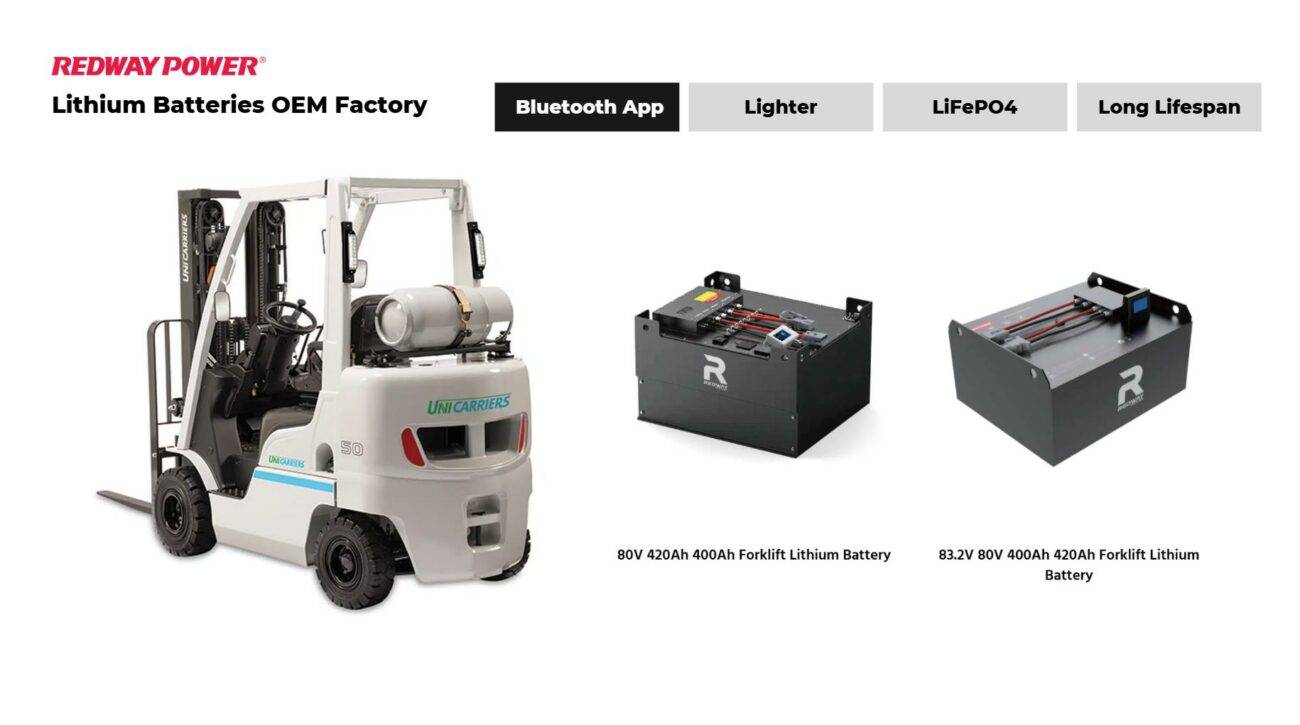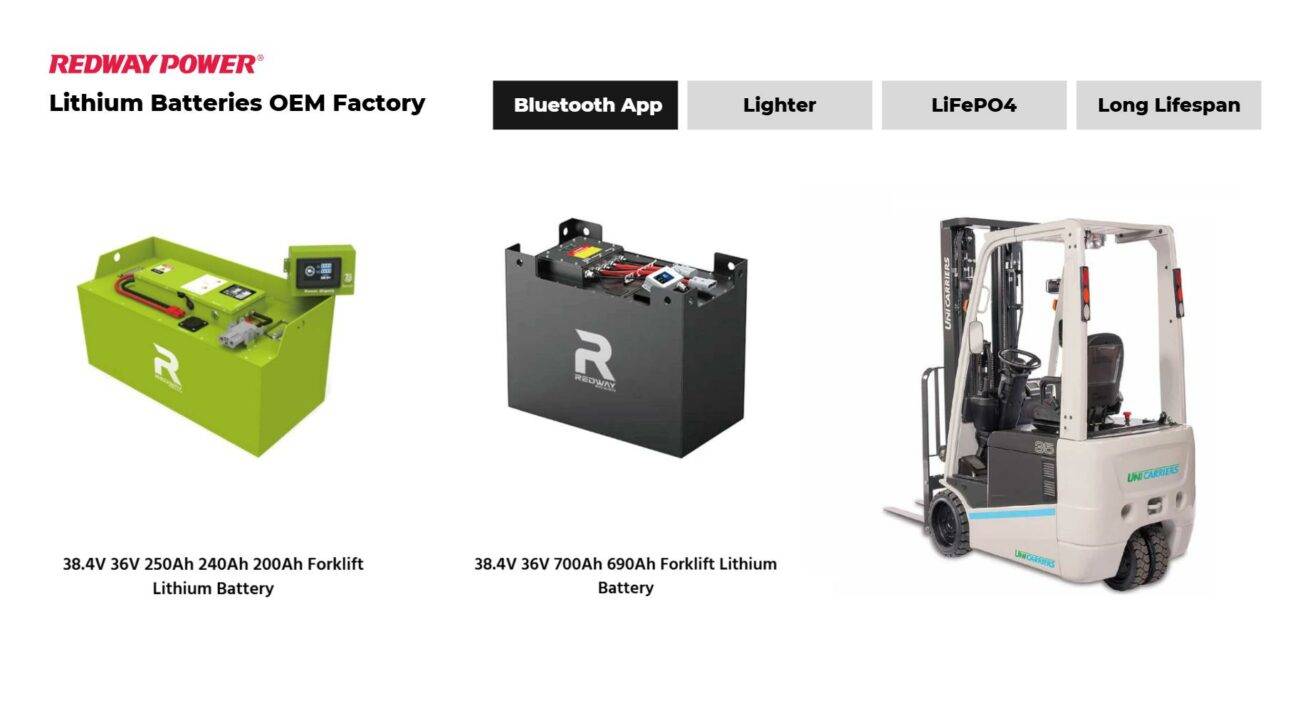- Lithium Golf Cart Battery
- Forklift Lithium Battery
-
48V
- 48V 210Ah
- 48V 300Ah
- 48V 420Ah (949 x 349 x 569 mm)
- 48V 420Ah (950 x 421 x 450 mm)
- 48V 456Ah
- 48V 460Ah (830 x 630 x 590 mm)
- 48V 460Ah (950 x 421 x 450 mm)
- 48V 460Ah (800 x 630 x 600 mm)
- 48V 460Ah (820 x 660 x 470 mm)
- 48V 500Ah
- 48V 560Ah (810 x 630 x 600 mm)
- 48V 560Ah (950 x 592 x 450 mm)
- 48V 600Ah
- 48V 630Ah
-
48V
- 12V Lithium Battery
12V 150Ah Lithium RV Battery
Bluetooth App | BCI Group 31
LiFePO4 Lithium
Discharge Temperature -20°C ~ 65°C
Fast Charger 14.6V 50A
Solar MPPT Charging - 24V Lithium Battery
- 36V Lithium Battery
- 48V Lithium Battery
-
48V LiFePO4 Battery
- 48V 50Ah
- 48V 50Ah (for Golf Carts)
- 48V 60Ah (8D)
- 48V 100Ah (8D)
- 48V 100Ah
- 48V 100Ah (Discharge 100A for Golf Carts)
- 48V 100Ah (Discharge 150A for Golf Carts)
- 48V 100Ah (Discharge 200A for Golf Carts)
- 48V 150Ah (for Golf Carts)
- 48V 160Ah (Discharge 100A for Golf Carts)
- 48V 160Ah (Discharge 160A for Golf Carts)
-
48V LiFePO4 Battery
- 60V Lithium Battery
-
60V LiFePO4 Battery
- 60V 20Ah
- 60V 30Ah
- 60V 50Ah
- 60V 50Ah (Small Size / Side Terminal)
- 60V 100Ah (for Electric Motocycle, Electric Scooter, LSV, AGV)
- 60V 100Ah (for Forklift, AGV, Electric Scooter, Sweeper)
- 60V 150Ah (E-Motocycle / E-Scooter / E-Tricycle / Tour LSV)
- 60V 200Ah (for Forklift, AGV, Electric Scooter, Sweeper)
-
60V LiFePO4 Battery
- 72V~96V Lithium Battery
- Rack-mounted Lithium Battery
- E-Bike Battery
- All-in-One Home-ESS
- Wall-mount Battery ESS
-
Home-ESS Lithium Battery PowerWall
- 24V 100Ah 2.4kWh PW24100-S PowerWall
- 48V 50Ah 2.4kWh PW4850-S PowerWall
- 48V 50Ah 2.56kWh PW5150-S PowerWall
- 48V 100Ah 5.12kWh PW51100-F PowerWall (IP65)
- 48V 100Ah 5.12kWh PW51100-S PowerWall
- 48V 100Ah 5.12kWh PW51100-H PowerWall
- 48V 200Ah 10kWh PW51200-H PowerWall
- 48V 300Ah 15kWh PW51300-H PowerWall
PowerWall 51.2V 100Ah LiFePO4 Lithium Battery
Highly popular in Asia and Eastern Europe.
CE Certification | Home-ESS -
Home-ESS Lithium Battery PowerWall
- Portable Power Stations
How to Select the Best 48V Battery for Your UniCarriers Forklift

Choosing the right battery for your UniCarriers forklift, particularly models T1B2L25U, 2B2L25U, W2R2L18U, and A3N1L15Q, is essential for maximizing performance and operational efficiency. This guide will help you understand the key specifications and considerations when selecting a battery tailored for these models.
How Do I Choose the Right Battery for My UniCarriers Forklift?
To select the appropriate battery for your UniCarriers forklift, consider factors such as voltage, amp-hour (Ah) capacity, weight, and dimensions. Ensure that the battery type aligns with your operational needs. For example, models like T1B2L25U and 2B2L25U can benefit from both lead-acid and lithium-ion technology based on usage patterns.
What Are the Key Specifications of UniCarriers Forklift Batteries?
UniCarriers forklift batteries are defined by several critical specifications:
- Voltage: Commonly available in 48V configurations for models like T1B2L25U and 2B2L25U.
- Capacity: Measured in amp-hours (Ah), indicating how long the battery can power the forklift.
- Weight: Heavier batteries provide stability but may affect efficiency.
- Dimensions: Must fit within the designated compartment of the forklift.
Here’s a summary of the specifications for five UniCarriers models:
| Model | Voltage | Capacity (Ah) | Dimensions (mm) | Weight (lbs) |
|---|---|---|---|---|
| T1B2L25U | 48V | 375 | 980 x 785 x 442 | 1906 |
| 2B2L25U | 48V | 520 | 982 x 535 x 590 | 1906 |
| W2R2L18U | 48V | 350 | 956 x 375 x 565 | 1036 |
| A3N1L15Q | 48V | 575 | 982 x 615 x 590 | 1884 |
| T1B2L25U (Alt) | 48V | 375 | 980 x 785 x 442 | 1906 |
Why Is Maintenance Important for UniCarriers Forklift Batteries?
Regular maintenance is crucial for lead-acid batteries, which require periodic watering and cleaning to ensure longevity and performance. Lithium-ion batteries are virtually maintenance-free, making them an attractive option for operations seeking to reduce downtime and maintenance costs.
How Does Charging Speed Affect UniCarriers Forklift Performance?
Charging speed significantly impacts operational efficiency. Faster charging allows forklifts to return to service quickly, reducing downtime. However, it is essential to balance charging speed with battery health to prevent premature degradation.
What Are the Costs Associated with Different Battery Types for UniCarriers Forklifts?
Costs vary widely between lead-acid and lithium-ion batteries:
- Lead-Acid: Typically ranges from $2,950 to $5,000 depending on capacity.
- Lithium-Ion: Prices range from $6,000 to $25,000; however, their longer lifespan often justifies the higher initial investment.
| Feature | Lead-Acid | Lithium-Ion |
|---|---|---|
| Lifespan | 1,000 – 1,500 cycles | 2,500 – 4,000 cycles |
| Maintenance | High | Low |
| Charging Time | Longer (6 – 8 hours) | Shorter (1 – 2 hours) |
How Do Lead-Acid and Lithium-Ion Batteries Compare for UniCarriers Forklifts?
Lead-acid batteries are generally cheaper but require more maintenance and have a shorter lifespan compared to lithium-ion batteries. Lithium-ion options provide longer lifespans and faster charging times but come at a higher price point.
What Should I Know About OEM Orders for UniCarriers Forklift Batteries?
OEM Tips for Battery Wholesale Buyers:
When considering OEM orders for UniCarriers forklift batteries, look for manufacturers with a solid reputation like Redway Power, which specializes in lithium batteries with over 13 years of experience. The process typically involves:
- Identifying your specific requirements.
- Contacting manufacturers directly to discuss customization options.
- Reviewing samples or prototypes before finalizing orders.
Industrial News
Recent trends indicate a significant shift towards lithium-ion batteries in industrial applications due to their efficiency and lower maintenance needs. Companies are increasingly investing in these technologies as they seek to enhance productivity while reducing operational costs.
Redway Expert Views
“Investing in lithium-ion technology not only improves efficiency but also reduces long-term costs associated with maintenance and replacement,” states an industry expert at Redway Power. “As more companies recognize these benefits, we expect demand for high-quality lithium batteries to surge.”
FAQ Section
- What voltage do UniCarriers forklift batteries typically operate at?
UniCarriers forklift batteries commonly operate at voltages ranging from 24V to 80V depending on the model. - How do I determine the right amp-hour capacity?
The right amp-hour capacity depends on how long you need your forklift to operate without recharging during shifts. - Are lithium-ion batteries worth the investment?
Yes, despite higher upfront costs, lithium-ion batteries offer longer lifespans and lower maintenance needs which can lead to cost savings over time.














